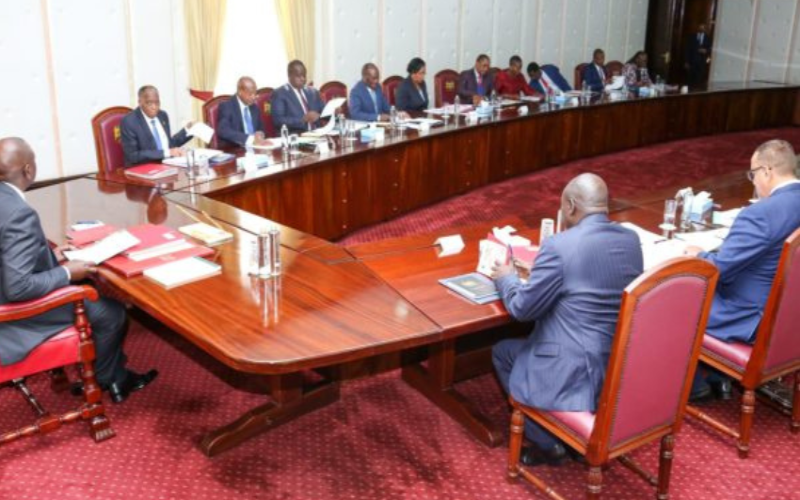
PRESIDENT William Samoei Ruto, Ph.D., C.G.H., today chaired his inaugural meeting of the nation’s apex policy organ – Cabinet, at State House, Nairobi.
The Cabinet Meeting was attended by all transitioning Cabinet Secretaries.
The day’s agenda centered on the state of the economy, assessment of the ongoing drought situation, the security situation in the country, and the Ebola Virus Disease Outbreak in Uganda.
In examining the state of the economy, Cabinet was apprised of the implementation of the Financial Year 2022/23 Budget; and thereafter Cabinet assessed the fiscal performance for the period ending August 2022.
Cabinet also assessed some of the risks to the implementation of the Budget such as drought; macroeconomic variables arising from inflation, interest rate, exchange rates, and the global prices of key commodities; disruptions in supply chains; and the impact of the geo
politics and various events on the global stage on our local economy.
Cabinet sanctioned the rationalization of the Budget to enable realignment of expenditure to bridge the fiscal deficit and to also enable the
administration more robustly respond to emerging national challenges such as the drought and other challenges to food security.
With regard to drought, Cabinet ratified the proposal by the Joint Working Committee to prioritize relief support to lactating mothers and school going children, so as not to widen the levels of inequity in the society. Special focus will also be given to vulnerable persons in hospitals. Further, the Meeting approved the framework for stronger co-ordination between the two tiers of Government and also between State and Non-State Actors; with a view of building better synergy and eliminating duplication of efforts.
In the medium term, Cabinet authorized a response plan for the next year that leverages on the bounty of our nation and the resources available so as to ensure that failure in rains does not result in Kenyan families being unable to feed themselves and their livestock.
In that endeavour the Administration will work closely with our development partners, the County Governments, and the Private Sector to create partnerships that reduce our reliance on rain-fed agriculture, introduce drought resistance crops that withstand extreme conditions, and create early warning and response mechanisms that are activated at the very start of adverse situations rather than when the situations have escalated into disaster conditions.
The Meeting was also apprised on the national roll out of the National Fertilizer Subsidy Programme; noting that increasing agricultural production and productivity was one of the key drivers to attaining food and nutrition security. In that regard, Cabinet reviewed the
scope of the Subsidy Programme so as to include a subsidy on fertilizer for tea farmers under the KTDA. Cabinet also approved a framework to facilitate fertilizer manufacturers who wish to set up blending companies in the country.
The nation’s apex policy making body also took note of the attempts by the former Board Members of KTDA to reverse the reforms that had
been made in the tea sector sub-sector and the new leadership they heralded. Cabinet reaffirmed that the Administration would not turn back on the reforms made by the previous administration aimed at strengthening the good governance of the tea sub-sector.
As the nation looks forward to the onset of the short-rains in early October, Cabinet called on all framers across the country to leverage on the opportunity afforded by the Government to boost their crop yields by purchasing their fertilizer from a NCPB Depot near them and under the Government Subsidy Programme.
The security situation in the country was assessed with a focus on Turkana, West Pokot, Baringo, and Elgeyo Marakwet Counties. It was noted that those areas had experienced cyclic waves of banditry and livestock raids; some of which had most regrettably led to loss of lives, injury, destruction of property, and displacement of persons.
The latest such incident, which occurred last week and claimed the lives of eight police officers, a senior chief and a renowned female peace ambassador, was highlighted. In memory of their lives and as mark of respect, Cabinet observed a minute of silence in their honour.
Cabinet thereafter authorized the deployment of formed police units within the affected areas whose mission shall be to maintain peace and security in the areas. Cabinet further directed that the peace and security initiatives shall also integrate local communities and their leaders in a joint peace initiatives aimed at ending decades-old communal tensions.
Drawing from the lessons learnt in the management of Covid-19 Pandemic, Cabinet took note of the Ebola Virus Disease Outbreak in Uganda; further noting that the highly infectious viral hemorrhagic fevers caused by the virus have a mortality rate of as high as 90%.
In that regard, Cabinet directed the Ministry of Health, together with all other concerned State Actors, to heighten the level of surveillance at all points of entry into the country. Cabinet urged all Kenyans to remain calm but also to be vigilant of any suspected cases; and to immediately report any suspected cases to the proper authorities.
To institutionalize our national response to Ebola, Cabinet approved the reactivation of the National Task Force on the Ebola Virus Disease. Cabinet further established an Incident Management Team with the mandate of coordinating our national Ebola preparedness and response efforts. The Incident Management Team shall work in close collaboration will all the Country Governments, with the border Counties taking their rightful lead.
By Fridah Wangechi | 1 year ago
By Fridah Wangechi | 1 year ago
By Ezra Manyibe | 1 week ago
By Fridah Wangechi | 1 year ago
KeNHA Issues Advisory on State of Athi River Bridge
Ezra Manyibe | 10 hours ago
ODM Postpones Grassroots Elections Indefinitely
Ezra Manyibe | 13 hours ago